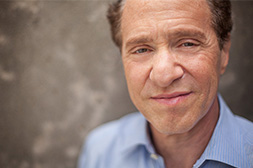
Robohub.org
Roadmap for creating Singooglarity?
Ray Kurzweil, one of the world’s leading inventors, thinkers, and futurists, announced in December 2012 that he will be joining Google as Director of Engineering to work on new projects involving machine learning and language processing.
 |
| Credit: Ray Kurzweil/Viking Press |
Creating Singooglarity
Visionary and transhumanist Kurzweil has published several bestseller books such as The Singularity Is Near and Transcend: Nine Steps to Living Well Forever, that may serve as roadmaps for creating new super-intelligent Google services.
In his latest 352-page book, How to Create a Mind, he explores how artificial intelligence can enrich and expand human capabilities.
From the book:
Kurzweil discusses how the brain functions, how the mind emerges from the brain, and the implications of vastly increasing the powers of our intelligence in addressing the world’s problems. He thoughtfully examines emotional and moral intelligence and the origins of consciousness and envisions the radical possibilities of our merging with the intelligent technology we are creating. Drawing on the most recent neuroscience research, his own research and inventions in artificial intelligence, and compelling thought experiments, he describes his new theory of how the neocortex (the thinking part of the brain) works: as a self-organizing hierarchical system of pattern recognizers. Kurzweil describes how these insights will enable us to greatly extend the powers of our own mind and provides a roadmap for the creation of superintelligence—humankind’s most exciting next venture. In Kurzweil´s vision we are now at the dawn of an era of radical possibilities in which merging with our technology will enable us to effectively address the world’s grand challenges.
Kurzweil’s ideas have been controversial before and generated criticism within the scientific community and in the media, including Microsoft co-founder Paul Allen, cognitive scientist Douglas Hofstadter and biologist P. Z. Myers. Also his new book has drawn criticism i.e. from Gary Marcus, a professor of psychology at N.Y.U.
tags: Google



